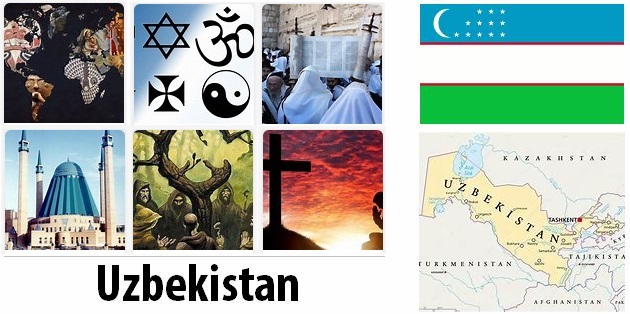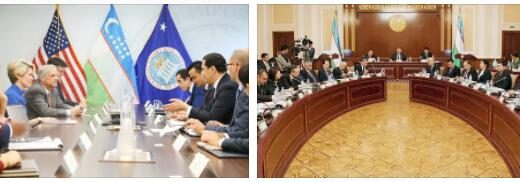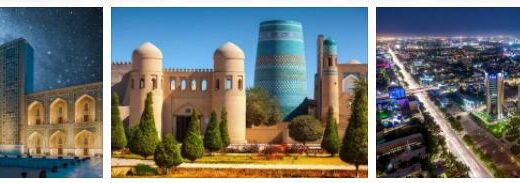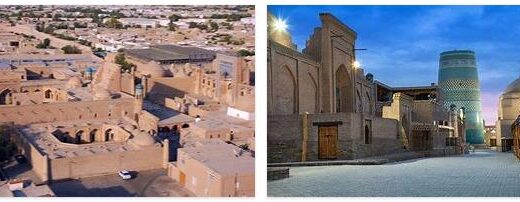Uzbekistan Religion
Islam has a strong tradition in Central Asia. The majority of the uz cups are Sunni Muslims. Russians and Ukrainians in the country are generally Russian Orthodox Christians.
Sufis (Muslim mystics) have founded a series of fraternities in Uzbekistan. The strongest are these in the Fergana Valley and Karakalpakstan, where they mainly attract young people.
According to the constitution, religious freedom exists, but in reality the rights are limited. The Religious Law of 1998 establishes such strict rules for the registration of religious communities that only a few have been approved. The authorities have banned several Muslim groups or ideological directions that they classify as extreme, including those inspired by Saudi Wahhabism (a strict and conservative form of Sunni Islam).
During the Soviet era (1924–1991), Tashkent was the seat of the largest of four officially approved Muslim administrations and two Islamic colleges. At the same time, religion that was practiced outside the official framework was suppressed, creating the ground for underground Islamism, especially in the Fergana Valley. This strengthened the Uzbek national feeling and became a driving force in the process of independence.
Since 1991, many mosques and Muslim educational institutions have been opened, some with financial assistance from Saudi Arabia. Some women have resumed the Muslim custom of wearing a veil, but this is being countered by the authorities.
The government is striving for good relations with the country’s highest religious leader, the Grand Duchy of Tashkent, while combating radical Islamist parties and movements (see Political system).
- Countryaah: Population statistics for 2020 and next 30 years in Uzbekistan, covering demographics, population graphs, and official data for growth rates, population density, and death rates.
Population
73.7% of the population are Uzbeks. The country is named after this strongest population group. The other nationalities have the following proportions: 5.5% Russians, 5.1% Tajiks, 4.2% Kazakhs, 2% Crimean Tatars, 2% Karakalpaks, 1.1% Koreans.
63% of the population of Uzbekistan live in rural areas, only 37% in cities such as Tashkent, Bukhara, Samarkand, Urgench and others. Population growth between 1990 and 1999 averaged around 2.3% per year. This reflects the high proportion of the rural population, the great importance of the family in Uzbekistan and the religious influences of Islam. The Russians in Uzbekistan live almost exclusively in the capital Tashkent and in other industrial areas. A larger Tajik minority has settled in the areas around Samarkand and Bukhara. The Karakalpaks live primarily in their home area, the Karakalpak Autonomous Republic.
With a gross national product of US $ 360 (2000) per resident, Uzbekistan is one of the poorer successor states of the Soviet Union.
Medical care is inadequate. The influences of the destroyed environment are increasingly affecting people’s health. This is evident on the one hand in the high infant and child mortality rates and on the other in the deaths from cancer and infectious diseases. The average life expectancy is 70 years.
There is a nine-year compulsory education. The illiteracy rate is 17% among women and 7% among men. It is very high.
In the villages, the transition from the predominant yurts to permanent houses took place over the decades. Today both can often be found next to each other.
2019
December
Faithful parties remain
December 22
The Uz Cup goes to parliamentary elections. The result is that the five parties represented in Parliament are allowed to remain. All of these parties are loyal to the government and support President Mirzijoev’s political line. The Liberal Democratic Party retains its position as the country’s largest party. In 22 of the country’s total 150 constituencies, the election must be redone within two weeks as no candidate has received enough votes. Election observers from the Commonwealth of Independent States (OSCE) and Shanghai Cooperation Organization (SCO) praise the election while the OSCEThe emissary states that the election was indeed conducted in a freer atmosphere than previous elections, but states that “serious irregularities” occurred during the election day. The OSCE also notes that the absence of opposition parties is a problem. The five parties in Parliament are the only ones registered in the country. According to the OSCE, the registration of new parties is bureaucratic and arbitrary.
September
The former spy boss is sentenced to prison
September 16th
Ichtijor Abdullajev, former head of the security service, is sentenced to 18 years in prison for practicing unlawful customs rules and for being involved in organized crime. Assessors say that the real reason for the verdict is that Abdullaev must have violated his powers and monitored and intercepted President Mirzijoev.
April
The president’s daughter gets a state job
April 12
President Mirzijojev’s daughter Saida Mirzijojeva is named Deputy Chief of the newly established State Press and Information Office.
March
The US allows Uzbek cotton imports
March 28
The United States repeals the import ban on Uzbek cotton. The ban was introduced in 2010 due to widespread use of children as a labor force during the cotton harvest. According to the United States, the impact of child labor has now “reduced significantly to isolated events”.
Karimova again in prison
March 5th
President Karimov’s daughter Gulnara Karimova is returned to prison after violating the rules of her house arrest. In 2017, Karimova was sentenced to ten years in prison for corruption, but in 2018 the sentence was converted to five years in house arrest. At the same time as Karimova is being returned to prison, she is being prosecuted by US authorities for suspected involvement in a major international bribe.
February
The head of the security service resigns
February 11
The head of the SGB security service, Ikhtiyor Abdullaev, is officially leaving for health reasons. However, behind the departure is the fact that a criminal investigation has been launched against him after it was revealed that some security agents were monitoring the presidential family. New security chief will be Abdusalam Azizov, who at the time of appointment is the Minister of Defense.




